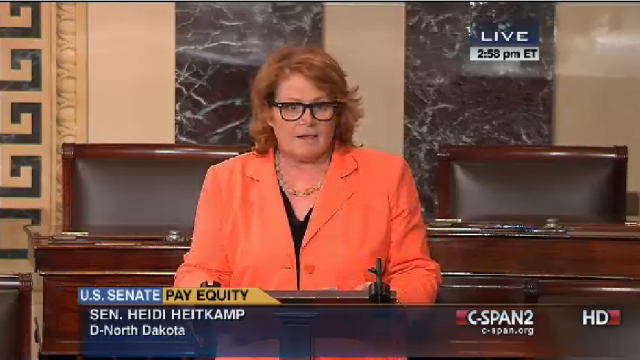Has Heidi Heitkamp Learned Nothing From Her Own State's Economic Success?

“I’m frustrated and deeply disappointed that the Senate failed to put hard working families first,” North Dakota Senator Heidi Heitkamp said in response to the US Senate shooting down a bill to increase the national minimum wage to $10.10 per hour, something she voted for
“I don’t know anyone in North Dakota earning the current minimum wage who can honestly make ends meet. We need to show all of the hard working North Dakotans – janitors, construction workers, administrative workers, and so many more – that they’re valuable, that they and their families are worth investing in, and that their jobs are needed. But today, Republicans showed they don’t want to support working families who are struggling to put food on their tables for their kids, trying to afford to keep a roof over their heads, and fighting to pay essential medical bills. It’s long overdue that we give North Dakotans and all Americans the better pay they need and deserve,” she said.
Those are some provocative words for a woman who has claimed that she doesn’t like insulting her political opponents (Republicans want working families to starve, I guess). But rhetorical hypocrisy aside, you have to wonder why it is Heitkamp can’t see the truth about how prosperity is created, even when it is right in front of her face.
North Dakota has lead the nation in income growth for the better part of a decade, and it’s not because of the minimum wage.
Here are some fun facts about income in North Dakota, which doesn’t have a minimum wage beyond the federal minimum:
- In six out of the last seven years North Dakota has lead the nation in personal income growth
- From 2012 to 2013, personal incomes in North Dakota grew at a rate 3 times fater than the national rate
- During that same timespan, North Dakota’s income growth rate was the fastest in the nation and double that of second place Utah’s
- The state now ranks third in the nation in per capita personal income at over $57,000, behind only Connecticut’s $60,487 and Washington, D.C., at $74,513
How did this happen in North Dakota? Not by the government waving its magical policy wand and mandating higher wages, but through economic activity. Through commerce. Through industry.
North Dakota has allowed business and industry to thrive, and while we could argue that some tax and other reforms are needed, relative to other states North Dakota is a pretty easy place to start a business and generate prosperity.
The minimum wage does none of these things. In fact, the minimum wage is the opposite of these things. It creates inflexibility in the labor markets. It costs people their jobs. While some may get a higher wage from the federal minimum (and probably very few raises after that), others will lose their jobs altogether.
How can anyone see that as a viable trade off for economic policy?
What America needs is jobs and opportunity, not election-year policy grandstanding.




